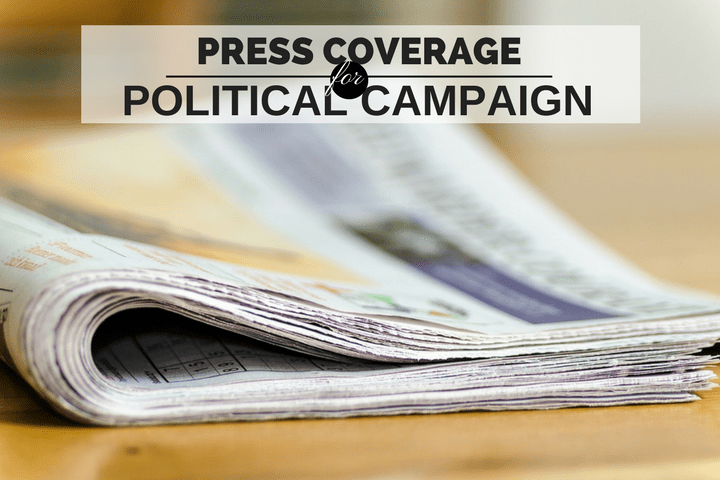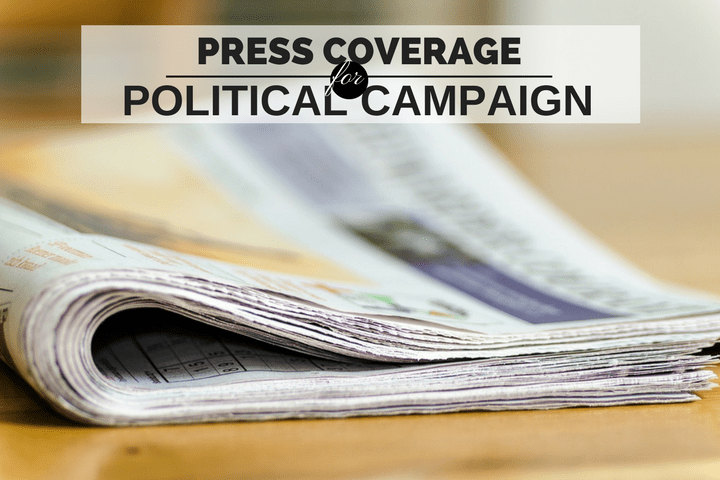One of the things often overlooked when designing a campaign’s outreach strategy is press coverage. It is true that the local or national media would follow the election closely based on their audience’s interest. However, without a media communication plan, the coverage could turn voters away with a single bad report.
Do you have a plan to ensure you get good coverage from the press throughout the campaign? Or get the press to talk about you at all?
The only way to get the press to cover your campaign is to do something “newsworthy”. Through the media attention, you get exposure among voters who support your take on the issues they face. But first, you have to earn the media’s attention. No wonder it is called earned media. Earned media encompasses news articles, TV and radio interviews plus online coverage on websites and social media.


It is important to get press coverage because the public trust these sources to be unbiased and point them in the right direction. Getting positive coverage from a media source not tied to your campaign is one of the best ways to win over new supporters.
So how do you make the best out of the press coverage your campaign gets? Below are 10 good processes to follow to achieve that.
Align with the message
The story that gets you press coverage could be anything from a public rally to a statement made on some trending matter in the electorate. The important thing here is to tie it to your campaign message. All your media efforts should do that – make your message or policies clear to the viewer. If the public is not clear on what you want to address through the media, the incentive to step forward to support your campaign would never appear for them.
Relationship with key media personnel
Your campaign should have a designated Press Secretary to establish relationships with key political reporters. If it’s a local campaign, you can even have the Campaign Manager be the one to build direct communication channels with them. The press should have easy access to get official campaign statements in case of any new developments or turn of events. It paints you in bad light if the press reports a story saying you were “unavailable for comment”.
Train the messengers
The staffer, volunteer or the candidate should be prepared well before speaking with the press. They should know what the story is to be about and the facts and figures related to the issue. Train them on the questions that might be raised and what stance they should take when representing the campaign. Explain that there should be no comment made “off the record” which could harm you if it makes the news.
Prepare a media kit
You should have a media kit ready to hand out to reporters covering the campaign. The media kit serves as an introduction to the candidate and establishes communication between the two. It should have the candidate’s bio along with official pictures to use, brochures, clips from other press coverage, papers on relevant issues and the press secretary’s contact information. This would help them reach out for future correspondence and increase your visibility in the media. Update the media kit with new information throughout the campaign.
Build a media list
Just like a voter list for direct communication with supporters, your campaign should maintain a media list for communication with the press. When you have an official statement to make on any breaking news or want to notify the press that the candidate is available for a public interview or that the campaign has an event on the horizon, the list would make it easy to send out media blasts. You could reach out to all important press channels and maximize your chances of getting covered.
Regular press releases
The campaign should send out press releases from time to time. The information you share could be something new regarding issues you focus on or about how the campaign itself is faring in terms of fundraising or public polls. These press releases keep the candidate on top of the audience’s mind without pestering them with repeated campaign ads.
Call press conferences
Press conferences are a good way to get press channels together for new announcements. Send out media advisories well in advance so that the reporters know when, where and why the event is taking place. On the day before the event, send out reminders or have the Press Secretary call up top reporters to ensure their attendance.
Attend radio interviews
Have your Press Secretary pull together a radio interview or podcast with a political show host with a steady following.Find a show where you could discuss the issues of interest and answer public questions directed through the host. That way you can cover a lot of ground with one interview. Whereas, in an interview with a reporter, you would be speaking only on the issues the reporter wants the story to be about. Prepare in advance so that the story ties in with your campaign message.
Specify the communication channel
The communication between the press and the candidate should be directed through the Press Secretary. The candidate should never reach out to the press on their own. Similarly, for interviews or other coverage, the media should communicate with the Press Secretary. Anyone working for the campaign should have a clear understanding of the message and approval from the Press Secretary before addressing the media.
Present the candidate’s human side
The interactions and messages should present the human side of the candidate as well. For that, you need to post photos on social media and discuss their family life with the press. This will give the audience some insight of the candidate’s personal life. The voter should understand that the candidate is a member of the community, just like themselves.
These processes will help you establish a fine line of communication with the press. Staying on top of the media is one surefire way of getting noticed by your voters and gaining a larger following.

